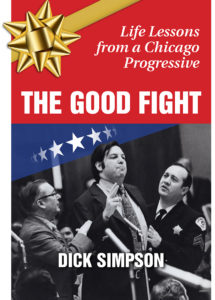Last month’s mid-term elections gave me (Nancy) an excuse to catch up with our author, Dick Simpson, to get his take on the current political landscape. And to our readers who are from Chicago (or wish they were), his book, The Good Fight, would make a terrific Christmas present.
And now the interview:
Nancy: You’ve been a college professor for 50+ years now, so you have a long perspective on the youth vote. Why do you think it grew exponentially in the recent mid-term elections?
Dick: You’re right. In 2014 19% of registered students voted. This time more than 30% voted. That’s more than 2.5 million more student votes over a similar election.
There are two reasons. First, there is a major effort at civic engagement happening at universities. Second, students are really upset by a lot of things in the Trump administration, which made them want to vote. It isn’t strictly along liberal-conservative lines. It has to do with issues like immigration, #metoo, partisanship, our country’s role in the world.
From the early figures on the election, students are voting about 67% Democratic. Universities are leaning left, yes. Going back to the 60s, when students tended to be more radical. But for a long time after that, students were about 50% Democrat, 50% Republican. But now the voting patterns are shifting. It’s harder to tell if this is a permanent ideological shift. It does bode poorly for Republicans, though. Because we know that students that get politically active tend to stay active throughout their lives. So the identify they adopt is likely to last for decades. So long-term, it’s a very negative portent for the Republican party. It wasn’t that way even 6 or 8 years ago.
Millennials also turned out more in this election than they ever had before. In Chicago, they were the largest voting group, which is a complete reversal of trends of past decades. So yes, there is something new going on.
Nancy: In Chapter 7 of The Good Fight, you quote the old saying, “Politics ain’t bean-bag.” How does today’s political climate compare to the unrest of the late 60s and early 70s?
Dick: Today’s divisions are similar to the 60s, and politics still isn’t bean-bag. There’s so much tension between the parties in the Congress and no substantial bipartisan legislation, not even on infrastructure. They can hardly agree that the sun came up this morning. If the other side wins, it is as if it is truly terrible.
There certainly is a way forward to a better state of politics, with plenty of room to move toward substantive goals. It takes moving toward a more civil democracy, a more participatory democracy.
Nancy: Americans seem woefully ignorant about basic American civics. Do you think it would help if we returned to teaching American History and Civics like we used to?
Dick: Basic civic knowledge is important. But more important is the actual practice of democracy. How do people get together and come to some common decision based on majority rule? To practice democracy is a chance to learn how to be a citizen. The Athenians 2500 hundred years ago didn’t teach democracy, they practiced it.
It’s hard to teach kids something they don’t care about or don’t feel the need to learn, even in political science classes. But once someone wants to take action, the mechanics are relatively easy to learn. In Illinois, we worked very hard to pass the law that you have to take a civic engagement class to graduate.
Nancy: In The Good Fight you talk about the negative attack ads during your run for Congress. What was the level of attack ads in the recent elections in Chicago?
Dick: It was very bad. There were two billionaires running in the gubernatorial race in Illinois, and their ads were entirely negative. That was also true of the congressional races; the outside money that came into the state was mostly to buy negative ads. It didn’t drive down turnout, though.
Nancy: One final question: do you care to make a prediction on the Democratic presidential ticket for 2020?
Dick: No, but I know there’s been a lot of talk about someone new emerging, people who are more embedded in the political process. Like Sherrod Brown of Ohio. We’ll see what happens.
Nancy: Thank you!

Interesting! My ears perked up when hearing Dick Simpson say that the increase of young voters in the recent election bodes poorly for Republicans because “students that get politically active tend to stay active throughout their lives.” If the writers in the memoir-writing classes I lead for people 55 and better in Chicago are any proof of this, it’s true. Ones who write about their participation in the political scene in the 60s are still paying attention –and definitely participating –in the political scene now, 50+ years later. Thanks for posting this, I’m going to share it with my writers.
Thanks, Beth. Truth is, when Dick said that about enduring political activity, a number of your students’ stories ran through my mind. It also made me wish I’d been more politically aware when I was young, but I was too busy being a know-it-all punk.